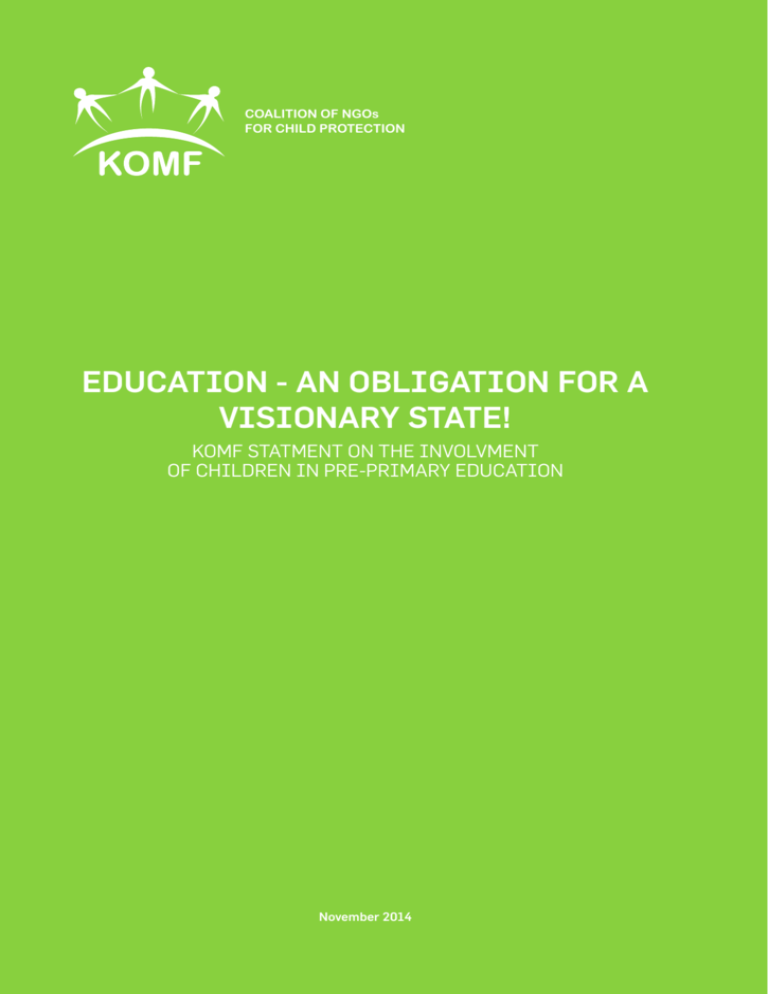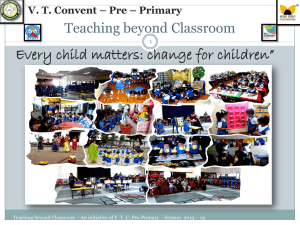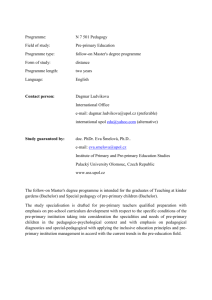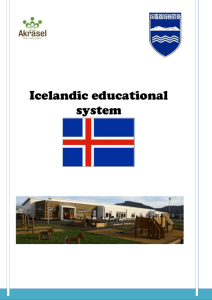Education - an obligation for a visionary statE!
advertisement

Coalition of NGOs for Child Protection Education - An obligation for a visionary state! Komf statment on the involvment of children in pre-primary education November 2014 1 © The position for pre-primary education in Kosovo is KOMF’s exclusive product. This publication does not necessarily reflect the views of KOMF donors. This publication may not be sold or used for profit purposes. KOMF: 16 non-governmental organizations working in the area of child protection in Kosovo have joined with the purpose of further coordination of their efforts in child protection, having a mission to protect, respect and advance the wellbeing and the rights of children in Kosovo. Member organizations are: Associazione Amici dei Bambini, Association for Social Training, Research and Advocacy - ASTRA , Initiative 6, Center for Protection of Victims and Prevention of Trafficking in Human Beings PVPT, One to One Children’s Fund, One To One Kosova – Center for Counselling of Families, Youth Organizations Akti, Save the Children, Hope and Homes for Children Kosovo, Terre des hommes, World Vision, SOS Children’s Villages in Kosovo, OPFAKKOS, Kosovo Education Center - KEC, Civil Rights Program and VoRAE. 2 Introduction Education is one of universal rights, a right guaranteed in the Convention on the Rights of the Child in Article 28. This universal right of the child is also adopted by the Constitution of the Republic of Kosovo, in its Article 42 and then adjusted through laws and regulations. Given the fact that the Law on Pre University Education in the Republic of Kosovo (no. 02 / l - 52) made compulsory pre-primary education since 2015, KOMF in order to respect the right of children in inclusion in education, has taken the initiative to make an analysis on the real options regarding the inclusion of all children and institutional capacities to implement this legal provision. In the meantime, this document does not affect issues related to the quality of pre-primary education. The education system in the Republic of Kosovo in all its levels, is organized based on the International Standard Classification of Education (ISCED UNESCO), classification which includes 9 levels in total, ranging from Level 0. Pre-university Education, has 5 levels, which are: • Level 0: Pre-school education (age zero (0) to six (6) years). With the Pre-University Education Law the education for the ages of five (5) to six (6) years is specifically regulated (pre-primary education); • Level 1: Primary education lasting 5 years (normally from the age of six (6)), which includes classes from 1 - 5; • Level 2: Lower secondary education lasting four (4) years (normally from the age of twelve (12)), which includes classes 6 - 9; • Level 3: Upper secondary education lasting three (3) years (normally from age fifteen (15), including classes from 10 to 12, including high school, vocational high school, the school of music and art; • Level 4: post-secondary education institutions and vocational education in period one (1) to two (2) years (usually by the age of eighteen (18)1. Law on Pre-University Education in Article 9.2 has determined the compulsory schooling that includes level 1 and 2, respectively primary and lower secondary school for a period of 9 years. 1 Law no. 04 / l-032 for Pre-university Education in the Republic of Kosovo, Article 9.1 3 Pre-primary education is mandatory by 2015 One of the novelties of this Law and the Education System in Kosovo in general, is the pre-primary classes, which as a class has begun to be organized well in advance, but with this law, it is regulated in particular, while aiming that the pre-primary education become part of compulsory education from 2015. But this will be achieved only after the financial analysis2 of the inclusion of all children in pre-primary education. Pre-primary education, according to this law is organized as part of the Level 0 (pre-school, ages 0-6 years) and part of the Level 1 of Kosovo Curricula Framework. The importance of pre-primary education Pre-primary and pre-primary in general has a special importance. In addition, the involvement of children in pre-primary education is essentially the realization of a fundamental right of the child at the earliest possible age, different researches show the importance of preschool education in early childhood, (ILO, 2012; UNICEF, 2011), not only in the development of the overall personality of the child, both in terms of mental, psycho-physical, socio-emotional and behavioural, but also for the social impact in the later stages of development of the child in society, such as: • The impact on the development (improving) of the readiness of children for school and learning; • Enables the registration on time in first grade in school; • Influences better attendance of the first grade, while making school more desirable; • Children who attend pre-primary, were less likely to repeat the grade and to drop out the school; • Pre-primary education influences the higher achievements of children and their successful completion of schooling; • Investing in pre-primary education, reduces the costs of education at later stages3; • Reduces inequalities in education and society, as well as reduces prejudices about diversity in education, culture and society in general, etc. 2 Law no. 04 / l-032 for Pre-university Education in the Republic of Kosovo, Article 49.2 3 International Labor Organization, (2012). Right beginnings: Early childhood education and educators. Geneva. Pg.9 4 Organization of pre-primary education Pre-primary education in the Republic of Kosovo, under the legislation in force, can be arranged in several ways, such as: • Within the school, as preschool class where pupils usually stay 2-3 hours a day at school and is free of charge (in public institutions); • Then, it is organized within kindergartens, day care centers, for which parents participate in public institutions with 50% of financial means (the percentage (%) varies by municipality); • Pre-primary classes in pre-university education private institutions, institutions in which parents pay for their children’s education up to 100% of assets; • And, the fourth form of organizing preschool classes is that within the Community Based Centres, which are funded by the community, by various donors, the donor-community cooperation and for some centres, the burden of organizing and financing was taken by their municipalities. 5 Findings: The Coalition of NGOs for Child Protection, in defence of children’s fundamental rights guaranteed under the CRC, states its position on the enrollment of children in pre-primary education: • During the 2013/14 academic year, in public pre-primary education a total 21,383 children4 were included, of whom 1,480 children in kindergarten and 19,903 children are involved in preschool classes. However, in private education altogether 35 children5 were involved. In these statistics children that are attending pre-primary education through Community-Based Centres, are not included. Viewed as a percentage, gross enrolment rate in preschool education in 2011/12 was 74%, in 2010/11 was 71.2%, whereas in 2009/10 was 69.6%6. • There is no official analysis that tells exactly how many children are not involved in pre-primary education. However, if we refer to previous years education statistics7, where from the number of students who have attended first grade we substract the number of children who have attended pre-primary education in the previous year, it appears that each year an average of 6000 - 7000 children remain out of pre-primary education process, respectively, depending on year this number represents, up to 30% of the total number of children of pre-primary age. This is consistent with Kosovo Education Indicators 2009/10, 2010/11 and 2011/128, according to which indicator, every year continuously the number of children enrolled in pre-primary education had increase, to achieve in 2011 / 12 up to 74%. In relation to the possible involvement of the number of children which are not included in pre-primary education, a detailed analysis regarding the overall cost of their involvement in pre-primary education is missing, including the specific needs of each municipality in: capital investment, wages, goods and services, in order to cover the needs of each municipality to reach the involvement of children to 100%. • Overall, Kosovo is considered to have a very advanced legislation in the field of education9 (pre-primary education for children aged 5-6 years is expected to become mandatory after a financial analysis done by 2015). Also, the legislation is quite complete with supporting documents (Administrative Guidelines, Curricula Framework and core curricula that specifically addresses pre-primary education, development and learning standards in early childhood 0-6 years old, Guidelines with Best Practices in classes for pre-primary educators, etc.). Despite this, all this legislation should find its application such as to enable the 100% inclusion of all children in pre-primary education and not to create disparities among them10. • priority and part of all national policies in pre-university Preschool education11 is made a education. However, this cannot be said for the local level, where even though with the legislation, municipalities have the main authority regarding the preschool education12 (this applies to preschool education, while the decision for it to be mandatory by law is not done). This in a way also has led many municipalities to not open new preschool class, because priorities have been other issues in the education. 4 MEST (2014), Statistics on Education in Kosovo 2013/14, Pre-university education, Pristina, Pg. 12 5 Ibid. Pg. 45 6 MEST, (2013), Indicators of Education in Kosovo 2009/10, 2010/11 and 2011/12, Pristina, p.12 7 MEST (2012, 2013, 2014). Education statistics in Kosovo 2011/12, 2012/13, 2013/14 8 MEST, (2013), Education Indicators in Kosovo 2009/10, 2010/11 and 2011/12, Pristina, p.12 9 Law no. 04 / l-032 for Pre-university Education in the Republic of Kosovo; Law no. 02 / L-52 on Pre-primary Education; Law no. 03/068 on Education in the municipalities of Republic of Kosovo; Law No. 2004/37 on Inspection of Education in Kosovo, etc 10 MED - Fushe Kosove: „In a primary school where new curricula are being piloted , no pre-primary class“ 11 Education Strategic Plan 2011 - 2016; Strategy for Development of Pre-University Education in Kosovo 2007 - 2017 12 Law no. 02 / l-52 on Preschool Education, Article 19 (2) 6 • The physical infrastructure of school buildings is improving day by day, creating special conditions for pre-primary classes. In general, also through field interviews it is confirmed that the physical infrastructure in most cases allows the opening of pre-primary classes even in those places where these class are missing. Exceptions to this do a small number of separate schools and classes in which classes are held in old facilities and insufficient space for learning13. • Important factor that affects the quality of work in pre-primary education, is also the monitoring and evaluation of performance of preschool institutions (including pre-primary grades) and the teachers. Based on the Law on Inspection of Education, as well as current legislation and education policy, monitoring and evaluation is one of the responsibilities of the Inspection Department of Education (SIA), which is part of the Ministry of Education, Science and Technology. However, is not only the task of SIA to do the monitoring because it a responsibility also of the municipal level of education, and undefinition, and the lack of clear division of tasks associated with monitoring the quality of education, remains one of the greatest challenges for quality assurance. In relation to all the work that has to do with monitoring the quality of education, in general, there is an impression14 that monitoring is a weak point in all pre-university education and the pre-primary education in particular. • Parents and the community in general, are not sufficiently informed about the importance of pre-primary education in child development. There are cases when certain locations offer preprimary classes, however not all parents send their children to pre-primary class15. 7 13 Sh.F.M.U, „Drita“, in Rubofc village, municipality of Lipljan, learning is held in an old facility, which is divided into two parts, one taught in Albanian and one in Serbian. In this school conditions are not as suitable for educational work, with a lack of space to work. For that reason until today there were no pre-primary classes offered. 14 Impressions of the representatives interviewed (DKA, MEST, school principals, UNICEF) 15 Interview with the principal of Sh.F.M.U. „Ibrahim Krasniqi“ - Smallusha, Lipjani. It states: „At the beginning of each school year usually there are 2-3 students coming into first grade of primary school and who have not attended pre-primary classes.“ Recommendations: The Coalition of NGOs for Child Protection (KOMF), with the purpose of inclusion of all children in pre-primary education RECOMMENDS: • To have an overall analysis by MEST on the situation of pre-primary education, the latest by the first half of 2015. This analysis should find in detail the exact number of children who are not involved in pre-primary education; then the place where they are located; what should be done to include these children in pre-primary education; accurate financial analysis of the cost of inclusion of these children and how to allocate funds proportionately according to the number of children in those places (Municipalities) where children are involved in pre-primary education. • The decision has to be taken by the Minister of MEST, in conformity with Article 9.3 and Article 49 of Law no. 04 / l-032 for Pre-university Education in the Republic of Kosovo, under which pre-primary education eventually becomes part of compulsory education for all children aged 5-6 years throughout the Republic of Kosovo, from the 2015/16 school year. • Legislation and all legal frameworks in the field of preprimary education, including the strategic documents such as the Curriculum Framework, Core Curriculum, Development and Learning Standards in early childhood 0-6 years, etc., to be supported financially and with human resources for an effective implementation also in those parts that relate to preprimary education. • To work more on the local level, to strengthen the municipalities in exercising their responsibilities in the field of education with the current legislation, so that the pre-primary education to be a priority of local policies in education. • To create infrastructural conditions where there is no infrastructure by MEST and municipalities, in order to create the opportunity for inclusion of all children in the pre-primary education in the relevant regions. In the case of construction of new facilities it is necessary to plan the construction of pre-primary classes. • Where there is no sufficient infrastructure to open pre-primary classes and lack of the conditions for such a thing, alternative forms of the preprimary education to be organized from the MEST and municipalities. This can be done in two ways: ₒ Opening of community-based centers, or other alternative forms of education, ₒ By subsidizing the private education, for the part of the pre-primary education and, ₒ To stimulate public-private partnership in the organization of the preprimary education. 8 • To do an analysis about the quality of education offered in preprimary education. • It is necessary for a better quality of education, a quality monitoring and inspection of the work from the MEST and municipalities throughout the pre - university education System in accordance with legislation, including in particular the pre-primary education. • To work more to sensitize the parents and the community in general by the MEST and municipalities, civil society etc., on the importance of pre-primary education for children’s development. The positive attitude of parents to pre-primary education is a key factor for the inclusion of all children in pre-primary classes. KOMF is aware of the budgetary constraints that exist with the current budget, but we consider as inherent the best interest of the child to realize a fundamental right, what is pre-primary education. Current investment in pre-primary education means investing in and developing the country’s economy in the long term, no later than in the next 20 years. 9 Achievements in pre-primary education • Involvement so far of over 70% for each year of children aged 5-6 years in pre-primary education. • The introduction of pre-primary education as obligated by 2015 through the Article 9.1 of the Law on Pre-University Education, although it is conditional on a financial analysis, constitutes a huge reach in the field of education. • Development of strategic documents such as Curriculum Framework and core curriculum that specifically include preprimary education, then the drafting of the Development and Learning Standards in early childhood 0-6 years, Best Practices Manuals in classroom for pre-primary educators and other important documents, as well as piloting them in schools including pre-school classes, shows that MEST is making efforts for pre-primary classes within the compulsory education. • Introducing Article 5 in AI 47/2007 that enables educators to work with two groups of children during the day and the organization of alternative forms of pre-primary education through Community Based Centers, show the interest of MEST to create various opportunities for the involvement of children in pre-primary education. 10 Number of children in pre-primary education Municipality No. of children in pre-primary education Male Female Total Decan 271 240 511 Dragash 200 208 408 Ferizaj 845 815 1660 Fushe Kosovo 65 68 133 Gjakova 457 438 895 Gjilan 646 637 1283 Gllogoc 537 457 994 Elez Han 64 59 123 Istog 261 233 494 Junik 41 19 60 Kacanik 247 256 503 Kamenica 201 187 388 Klina 217 205 422 Leposaviq 0 0 0 Lipjan 516 450 966 Malisheva 565 544 1109 Mamusha 0 0 0 Mitrovica 420 396 816 Novo Berda 37 25 62 Obilic 154 149 303 Peja 669 648 1317 Podujeva 665 570 1235 Pristina 1300 1151 2451 Prizren 743 634 1377 Rahovec 417 400 817 Sterpce 14 27 41 Shtime 191 200 391 Skenderaj 374 313 687 Suhareka 420 393 813 Viti 305 322 627 Vushtrri 269 215 484 Z. Potok 8 5 13 Zveçan 0 0 0 Total 11119 10264 21383 16 Source: Education Statistics in Kosova Primary Female Male 11 48.0% 52.0% Newsletter Newsletter Newsletter Bi No. 06 Koalicija Zaštitu Dece November No.NVO-ja 05 2013za – March 2014 April – July 2014 November Br.2013 05 – March 2014 Copyright © KOMF Copyright © KOMF 12 Copyright © KOMF Coalition of NGOs for Child Protection Os for Child Protection Coalition of No. NGOs 05for Child Protection • Is the best interest of the • Is abandoned the best interest of the• Da abandoned li se poštuju inte children being respected children in June Kosovo? being respected Kosovo? dece 1 Celebrated, KOMFin calls outna toKosovu? invest in Analysis on the protection of abandoned Analysis children on the protection of abandoned children Analiza o zaštiti napuštene d the children! in Kosovo (0-3 years) in Kosovo (0-3 years) Kosovu (0- 3 godina) • We want to know our rights! • We want to know our rights! • Zelimo da znamo sv the International ofsada Convention marks for International Child Day ofStrugaj: Convention for Child so on Twitter KOMF nowKOMF alsomarks on Twitter KOMFDay odKOMF i nathe Twitter KOMF obeležava Međunarod Editorial note by Gladiola Rights. Children ask for more information Rights. Children ask for more information Decija Prava. Deca zahtevaju What doessada an abandoned child need? he mission to You may also join the mission to Misiji za zaštitu dece na Kosovu • Explain the delay of payments • Explain of the the delay social of payments of the osocial • Razjasnite kašnjen Kosovo throughKOMF protect children in Kosovo through možete da se pridružite preko tviteva has a new schemes! schemes! Pismo upućeno Vladi Kosova tweets. website now! Letter to the Government of Kosovo Letter to the Government of Kosovo Advance protection of abandoned children Partite nas na @komfkosova •inMislite u potr mfkosova Follow us at •@komfkosova the Analysis on advancement protection Think about the children • Think in Roundtable need! aboutforthe children need!oof deci me! Pismo upućeno Premijeru Ko Find out the latest on DOBRODOŠLI! of to abandonmen children aged 0–3 Letterinformation to the Prime Minister Letter the Prime Minister You are welcome! child protection in Kosovo our • Child abuseatin the media, • Child abuse in the media, • Zlostavljanje dece u Children are not a priority for the politicians official site: legal and ethical violation Street: Zenel Salihu legal and ethical violation pravna i eticka kršen KOMF sends its recommendations to political parties www.komfkosova.org OB.1, HY.1,Workshop K.3, Nr.16,with the Media in Kosovo Radionica sa Medijama ne Ko Workshop with the Media in Kosovo Join us! 10000 Prishtinë, Kosovë for Children • Together for Children • Together • Zajedno za decu info@komfkosova.org alongsides Agreement signed between KOMF Agreement and Media the Press signed Council betweenchildren KOMF and the Pressizmeđu CouncilKOMF i Sa Sporazum www.komfkosova.org Roundtable with Media • Protest against discrimination • Protest • Protest protiv diskri Facebook: KOMF against discrimination Down syndrome Kosova Down syndrome Kosova Twitter: @komfkosova KOMF Project “Who speaks out for me?” s supported by the UNICEF Office in Kosovo unite for children KOMF Project “Who speaks out for me?” Is supported by the UNICEF Office in Kosovo unite for children KOMF is supported Projekti i KOMF “Kush flet për mua?”, by Mario project përkrahet nga Zyra e UNICEF në Kosovë Syndrom Down Kosovo KOMF is supported by Mario project




![topic 6 [ DRELINT31102013_5 ]](http://s3.studylib.net/store/data/007202403_1-7ddc0e4fa3b0c295f3dc83dedb13ed18-300x300.png)


